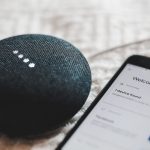
Paper co-authored by my PhD students Yue Huang and Borke Obada-Obieh has received a Honourable Mention award at CHI 2020. Such awards are given to top 2-6% submissions.
Yue and Borke spoke to 26 Canadian adults who used shared smart speakers at home, including Amazon Echo, Google Home and Apple HomePod. We found that participants not only worried about keeping their data safe from the manufacturer or other entities; they also feared potential misuse of the device by people they actually live with and know.
To summarise, the main findings of this study are as follows:
- Users have concerns, some of them latent, towards both external (e.g., device manufactures, governments, and hackers) and internal entities (e.g., housemates and visitors).
- Their coping strategies are often all-or-nothing, indicating a need for more effective risk management.
- Participants’ concerns with respect to their housemates are often related to their mental models of speaker sharing. As such, improving user experience could help users with limited mental models to better understand their shared devices. Users should be made aware of how technology supports better risk management.
- Participants’ perceptions of smart speaker risks are influenced by social media.
- Multi-user features do not support users’ needs well.
- Trust in the device manufacturers needs to be developed and maintained. Speaker manufacturers should build trust with their customers by, for example, helping the public to better understand their data collection, retention, and sharing practices (and possibly even the corresponding security controls, policies, and processes employed by the company).
- Smart speaker companies should also explain and minimize the convenience-privacy trade-offs that they offer to the users. Since device brand is a factor that influences users’ device adoption, we believe that maintaining such transparency will also benefit the speaker manufacturers in the long term.
- To ease the concerns (including latent concerns) about other housemates accessing information through the shared smart speaker, users should be able to customize what personal information they are willing to share and the people they want to share with.
- As voice recognition technology continues to mature, device manufacturers should improve the voice recognition on smart speakers to reduce false positive rates to acceptable levels.
More details can be found in the paper:
Yue Huang, Borke Obada-Obieh, Konstantin Beznosov, “Amazon vs. My Brother: How Users of Shared Smart Speakers Perceive and Cope with Privacy Risks,” in Proceedings of the ACM CHI Conference on Human Factors in Computing Systems (CHI ’20), April 25–30, 2020, Honolulu, HI, USA.
Post image credit: Bence Boros/Unsplash

